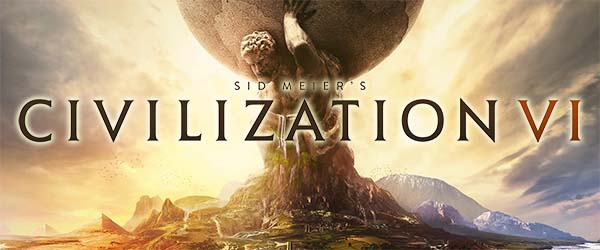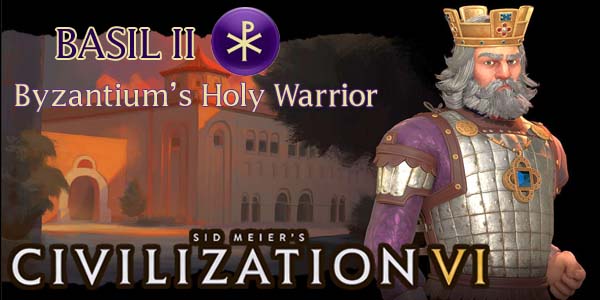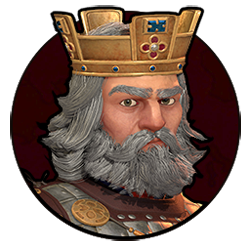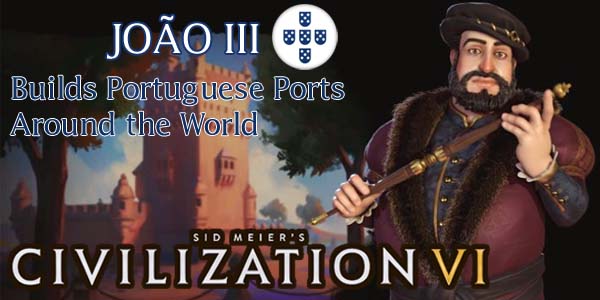
The announcement trailer for Sid Meier's Civilization VI made me very excited. Not just because there was a new iteration of my favorite PC game franchise, but also because the message of the trailer made me excited for the possibility that Civilization VI would take a much more humanist and globalist approach to its gameplay and victory conditions.
The Civilization games have always had a very optimistic tone, treating human development as being constantly progressing forward. Growing your civilization and building more things is almost always better. For the most part, Civilization treats human history as a constant forward march towards a better, more prosperous tomorrow.
This is despite the games including mechanics for "Dark Ages", climate change, nuclear fallout, occasionally pandemics and plagues, and so forth. Regardless of these mechanics, the civilizations of the game never regress, unless it's by the sword or gun of a conquering civilization, in which case, that other civilization is glorified. Climate change or nuclear winter can run rampant and render the surface of the Earth borderline uninhabitable for modern human life, but a civilization can still accumulate enough science or tourism or faith or diplomatic votes to win one of the various victories, or they can be the sole surviving civilization, presiding over a barren wasteland. But it's still a win.
Civilization is a game about cutthroat nationalism.
Despite vague gestures towards diplomatic cooperation and solving global crises, Civilization is, at its core, a game of competitive, cutthroat, zero-sum nationalism. This design ethos is probably the result of Civilization's inspirations coming from competitive board games like Avalon Hill's Civilization and Risk. "Our country is better than your country," and the whole game is an exercise in proving that. Further, one civilization's success must come at the expense of every other civilization's failure, even if those civilizations are friends or allies. One civ wins; all others lose. Every decision made is done to move your civilization closer towards one of those victory conditions, and every diplomatic agreement, trade deal, or alliance that you strike is only a temporary means to that end.
So what did Civ VI's trailer do to change my expectations for that game?
This essay is also available in video format on YouTube.
The trailer
Well, first, it's important to know how previous trailers and intro cinematics for Civilization games had introduced their respective games. Usually, they emphasized a single nation or leader doing great things. Winning wars, building wonders, developing advanced technologies, and so forth. And they usually ask the viewer: "How will you run your civilization?" and "Will your civilization stand the test of time?"
The trailer for Civilization VI takes a different approach. Let's take a look:
Civilization VI's announcement trailer celebrates the collective achievements of all of humanity.
"We are the explorers, the inventors, the architects of change, the builders of a better tomorrow.
We strive, we dream, we inspire, always towards something greater.
All the odds we defy, the risks we take, the challenges we endure, only make us stronger.
There's no end to our imagination, and no limit to civilization."
- Sean Bean narrating Civilization VI announcement trailer
Notice the language that is used. The Civ VI trailer uses plural language such as "we", "us", and "out". "We are the builders of a better tomorrow.". "the challenges we endure, only make us stronger." "There is no end to out imagination, and no limit to civilization.". And so forth. The trailer for Civilization VI isn't a celebration of one civilization or leader rising above all others and being crowned the "greates" civilization; it's about the collective achievement of all of humanity -- not a civilization, but all human civilization!
It's a beautifully humanistic expression that emphasizes plurality and doesn't elevate any one culture or race or nation above any other. It celebrates the collective technological advancements, engineering, art, and struggles of all of humanity, without implying that any one nation or group has the best stuff. It emphasizes that we can overcome challenges by working together, and come out the other side stronger for it. It implies that when we cooperate to build something or solve a problem, the result will be better than what any individual entity can accomplish. [More]

This will be the second part of a 2-part Retrospective on Civilization VI. The first part features my personal list of Top 10 Good Ideas that Firaxis put into the game, and this second part will be the Top 10 Bad Ideas. If you haven't read the Good Ideas yet, then I highly recommend you check that out first, as there will be several topics in this list that will build on what was said in the previous list. In fact, there will be some topics that are appearing in both lists, so I hope you'll read the good things that I have to say before reading the bad.
I also don't want to be a complete downer, and would like to provide constructive feedback. So wherever possible, I will try to make suggestions on how I think Firaxis could improve on some of these ideas if they chose to revisit them for future games. And some of these ideas are certainly worth re-visiting.
This content is also available in video essay format via YouTube.
[More]
07ea0b45-5d98-4ac1-9e2c-064bddd336aa|1|5.0
Tags:Civilization VI, Civilization VI: Rise and Fall, Civilization VI: Gathering Storm, Civilization VI: New Frontiers Pass, Sid Meier's Civilization, retrospective, top 10, privateer, pirate, world congress, agenda, leader, museum, trade route, wall, diplomacy, disaster, climate change

With the New Frontiers Pass for Civ VI over, an "Anthology" edition of Civ VI on sale, and no news at all regarding future DLC or expansions, I'm assuming that Firaxis has finished with Civ VI. As such, I want to look back on the game and reflect on the things that I liked most about it, and the things that annoyed me the most.
After the lifespan of Civilization V had ended, I wrote up a pair of retrospective blogs about my personal Top 10 Good Ideas and Top 10 Bad Ideas that went into that game. I'll be doing the same thing now with Civ VI.
I want to stress that this is a list of 10 good and bad ideas -- not necessarily good and bad mechanics. Some of the good ideas will be ideas that I like in principle (or on paper), but which might need more iteration before they truly work as intended. In contrast, there may be some bad ideas that work fine mechanically, but which hurt the "flavor" or theming of the game, in my opinion.
This is, of course, a subjective list of personal favorite and disliked concepts in the game. I'm sure there will be a lot of disagreement, and some of the things I write here will probably be somewhat controversial with the rest of the player base. So I'm interested in reading others' feedback. So if you agree with any of my points, or you vehemently disagree, feel free to post a comment and share your thoughts.
This content is also available in video essay format via YouTube.
This first post will cover my personal Top 10 Good Ideas, and I will follow it up with the next post being about the Top 10 Bad Ideas. [More]
549df3d2-8086-446d-bb11-35103ccef5b9|1|5.0
Tags:Civilization VI, Civilization VI: Rise and Fall, Civilization VI: Gathering Storm, Civilization VI: New Frontiers Pass, Sid Meier's Civilization, retrospective, top 10, music, Christopher Tin, Baba Yetu, agenda, wall, scout, skirmisher, ranger, diplomacy, alliance, disaster, climate change, barbarian, city state, leader

Firaxis has released the final update for its "New Frontiers" DLC Pass for Civilization VI. I have attempted to create guides for each new civilization included in the packs, but there is one civilization that I just didn't have time to cover when it was first released. That civilization was part of the September 2020 update, and it is the Byzantine Empire, lead by Basil II.

It looks like "New Frontiers" represents the end of the Civilization VI life cycle. If that is true, then don't fret. If I get enough demand from my Patrons, I'll also write guides for the "New Frontiers" game modes, or go back and create / update guides for legacy leaders. We also have new games such as Old World and Humankind coming out. I'll be playing both games when they release on Steam, and can also write guides for those games, if my supporters ask for it.
By the third century AD, the Roman Empire had expanded to control much of Asia Minor and the Eastern Mediterranean. The cities in the eastern Greek, Asia Minor, and eastern African provinces tended to be larger and more developed than settlements in the west, owing largely to the Greek and Macadonian empires that had preceeded Rome's occupation of the regions. This made these cities far wealthier than most western cities, and in 330 AD, Emperor Constantine relocated the Roman capital to the city of Byzantium due to its strategic location at the epicenter of trade routes between Europe and Asia, and between the Mediterranean and Black seas. The empire was later split into Western and Eastern administrative partitions, each with its own emperor. When Rome was sacked in 476 and the Western Roman Empire collapsed, the Eastern Empire in Constantinople continued to thrive.
It can be argued, thusly, that the Roman Empire survived until the fall of Constantinople to the Ottoman Turks in the 15th century. However, even though the Byzantine Empire can trace its authority directly to Imperial Rome, and it retained much of the legal and administrative framework inherited from the Roman Empire, eastern culture had begun to diverge from western culture before even the fall of Rome. Most citizens of the Eastern Empire may have considered themselves to be "Roman", but they spoke Greek instead of Latin. The architecture utilized ornate domes and spires as opposed to the austere columns, arches, and triangles of Latin architecture. Religious practices in the east also gradually transitioned away from the dogmatic practices of the Catholic Church until the Schism of 1054 formally established the Eastern Orthodox Church. It is, thus, equally accurate to say that the Byzantine Empire came to represent its own unique culture, independent of the Western Roman Empire.

Basil II Porphyrogenitus was a life-long ruler of the Eastern Roman Empire. He was coronated as co-emperor along with his brother when he was just two years old, and ascended to the status of senior emperor at the age of 18, ruling until his death almost 50 years later. For most of his reign, he personally lead his armies into battle against Anatolian rebels, Bulgaria, the Fatimid Caliphate, and the Kingdom of Georgia, securing the empire's borders in both the west and east. Despite being away from Constantinople for so long, he also found time to distinguish himself as an administrator, reforming tax and property laws to protect poor land-owners from exploitation by wealthier elites. He also married off his sister to Vladimir I of Kiev, securing an alliance with the Kievan Rus and converting them to Orthodox Christianity. His reign was so successful, that the Empire prospered for decades after his death, despite his successor emperors being considered largely inept by both contemporary writers and modern historians. Though he is considered a national hero by the Greeks, he is known as "Basil the Murderer" by Bulgarians.
Basil II favors aggressive religious play backed up with a powerful mounted army and navy. He should seek to convert or conquer rival holy cities as soon as possible, then crush or convert his remaining rivals.
[More]
9717627d-e9ed-44d7-b203-9c3945c77bcd|2|5.0
Tags:Sid Meier's Civilization, Civilization VI, Byzantine Empire, Byzantium, Basil II, porphyrognnetos, taxis, hippodrome, tagma, dromon, Divine Guardian, entertainment complex, amenity, cavalry, heavy cavalry, navy, religion, holy city, prophet

Firaxis has released the final "New Frontiers" update for Civilization VI. This update from March 2021 includes the new civilization Portugal, lead by João III.
If Firaxis decides to launch a second "New Frontiers" season, I will continue to write guides for the new civilizations and leaders. I will also put up polls on Patreon to let my Patrons decide which civ or leader to cover first (if Firaxis gives enough advance notice).

If "New Fontiers" is the end of the life cycle of Civilization VI, then don't fret. If I get enough interest from my Patrons, I'll also write guides for the "New Frontiers" game modes, or go back and create / update guides for legacy leaders. We also have new games such as Old World and Humankind coming out. I'll be playign both games when they release on Steam, and can also write guides for those games, if my supporters ask for it.
Portugal rose to prominence during the "Age of Discovery" in the 15th and 16th centuries, exploring the world and becoming the first global maritime empire. It established colonies and/or outposts in Brazil, Africa, India, and east Asia, it monopolized the spice trade, and was responsible for the formalization of the division of the globe into hemispheres. Portugal's dominion was short-lived however. A devastating earthquake in Lisbon in 1755, followed by occupation by Napoleonic France, and the eventual independence of Brazil combined to collapse the Portuguese maritime empire.

Portugal's maritime empire was laregely secured by King João III "The Pious" during his reign in the first half of the 16th century. João III established the first European colonies in Brazil and began importing Brazilwood into Europe, which was popular for creating red dyes. He was considered a scholar, humanist, and diplomat who supported the arts, granted scholarships to foreign universities, and remained neutral in wars between other European powers. But history is never so black-and-white, and João III is no exception. He also imported South American slaves into Europe from Brazil, and he boosted Portugal's relationship with the Vatican by allowing the Inquisition to establish itself in Portugal.
DISCLAIMER:
Civilization VI is still a "living game". Strategies for the game (and for specific leaders and civs) may change as Firaxis applies balance patches, introduces new features, or expands the game through further DLC or expansion packs, or as the Civ community discovers new strategies or exploits. As such, the following strategy guide may change from time to time. I will try to keep it up-to-date, and will make notations whenever changes are made. I'll also post links in the official 2K forums and CivFanatics, where I'll also report any changes made. If possible and practical, I will try to retain the original content of the strategy for posterity.
I welcome any feedback or suggestions that readers wish to offer. Feel free to post on the linked forums, or by posting a comment at the bottom of the page.
This guide is up to date as of the release of the [final] "New Frontiers" April 2021 Update (ver. 1.0.12.9)
João III explores the map to meet all other civilizations and city states, and will seek to establish peaceful trade relations with all of them, including constructing trade infrastructure in those other civilizations' cities. [More]
2a321222-ca59-47b4-8957-6177b584e9a1|0|.0
Tags:Sid Meier's Civilization, Civilization VI, Portugal, Portuguese, Joao III, casa da India, porta do cerco, navigation school, nau, caravel, feitoria, navigator's legacy, campus, navy, trade route, exploration, diplomacy, first contact
|

| 12 | | | | | | | 60 | | 11 | | | | | | | 55 | | 10 | | | | | | | 50 | | 09 | | | | | | | 45 | | 08 | | | | | | | 40 | | 07 | | | | | | | 35 | | 06 | | | | | | | 30 | | 05 | | | | | | | 25 | | 04 | | | | | | | 20 | | 03 | | | | | | | 15 | | 02 | | | | | | | 10 | | 01 | | | | | | | 05 |
|